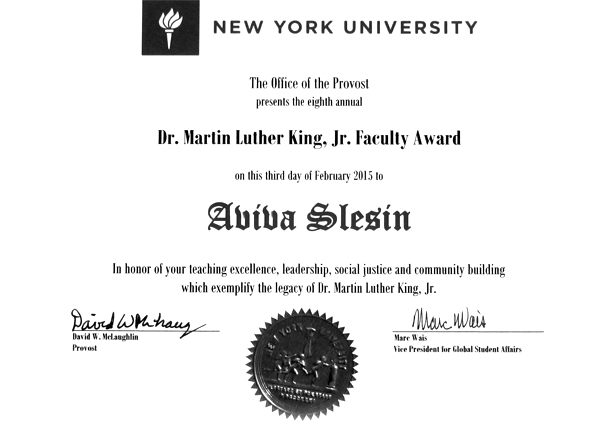Aviva is a member of the faculty at New York University's Tisch School of the Arts. She currently teaches in Open Arts/Special Programs and her courses are open to students from all of NYU and Tisch. She recently won the Dr. Martin Luther King, Jr. Faculty Award from New York University (click image on right).
Master Class: Documentaries
This course is designed to foster a greater understanding and appreciation of the many techniques and styles in documentary filmmaking through screenings, class discussions and talks with guest filmmakers. A documentary is screened in each class (both contemporary and classic documentaries are included) followed by an in-depth discussion about the creative and technical decisions that were used in the film. Most weeks a guest – someone who had a pivotal role in the making of the documentary that is screened – is invited to come and speak to the class. The guests include producers, directors and editors. These working professionals share their experience and expertise and answer questions about their work thereby providing insights into the decisions, tools and skills that go into the making of good documentaries.
Essentials of Documentary Pre-Production
This course is designed to provide students with a “jump start” into producing documentaries by learning the best practices and essentials of pre-production. Students gain experience in developing and researching their ideas, finding and securing access to key subjects, pre-interviewing these subjects, writing a good pitch and a cogent, powerful proposal that includes the why, where and how of the film they are planning to produce. Students learn about stock footage, permits, release forms, rights and how to create a realistic shooting schedule. They are also encouraged to research funding sources. The object of this training is to gain, by preliminary planning, the freedom and confidence to act spontaneously once they are in production. Along with screenings and class discussions, a few guest filmmakers share their proposals and budgets and talk about how their films adhered to or changed from their original pre-production plans. By the end of the course each student is prepared to move into production.
Through the Documentary Lens: Human Rights
This course is designed for students with an interest in exploring Human Rights through viewing and discussing documentaries. The course covers different perspectives and provides insights into both the subject matter contained in the films and the techniques and skills of good documentary filmmaking. Through research, class screenings, discussions and a few invited guest filmmakers, students learn about the evolution of the documentary genre as a means of better understanding history and gain an overview into what has been accomplished and what still needs to be done in the uphill fight against Human Rights violations worldwide.
Through the Documentary Lens: Civil Rights
This course is designed for students with an interest in exploring the Civil Rights Movement of 20th century America through viewing and discussing documentaries. By emphasizing the period from 1954 through 1972, which was chronicled by the television/film media, the course covers different perspectives about the historical/political/cultural milestones of the movement and provides insights into where we are today. Along the way, the course shows the techniques and skills of good documentary filmmaking. Through weekly screenings of films, class discussions, invited guests, students learn about the evolution of the documentary genre as a means of better understanding the history of Civil Rights in America. Students also investigate how crucial creative filmmaking decisions are made and how these decisions influence their thinking about what happened. A few invited filmmakers offer personal perspectives and add depth and context to the films and subjects screened.
Andrew Jenks: Shout-Out to Good Teachers

